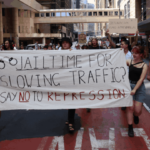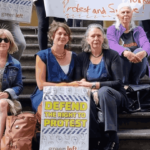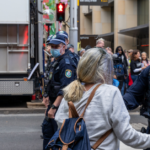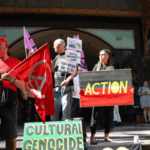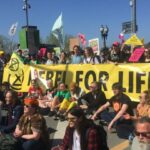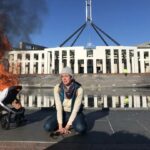Disrupting Roads Is for Planet Not for Kicks, Says Stop Fossil Fuel Subsidies’ Danny Noonan
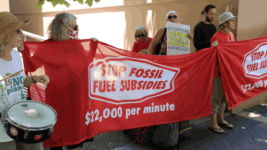
Right now, governments across the country are cracking down on climate defenders and the nonviolent direct actions that they’ve been taking via the enactment and enforcement of oppressive laws that threaten hefty prison time for protests that involve disrupting business as usual.
Climate defending groups Fireproof Australia – now Stop Fossil Fuel Subsidies – and Blockade Australia were taking heightened disruptive actions in March, which led the Perrottet government to enact its new anti-protest regime.
Indeed, the Coalition was in such a hurry to pass these laws that it shows not only is it determined to silence the calls to take adequate climate action, but it further reveals that these actions were having the desired effect in raising public awareness to the need to act on the climate crisis.
The first casualty of the Perrottet government’s war on protest has been Violet Coco, who was sentenced to 15 months prison time on 2 December in relation to a Fireproof Australia Sydney Harbour Bridge disruptive action that merely blocked one lane of traffic for a 25 minute period.
The campaign continues
Following the imposition of the new regime that sees those blocking a road, a tunnel, a bridge or a major facility facing up to 2 years imprisonment and/or $22,000 fine, Stop Fossil Fuel Subsidies has taken its campaign to the ACT, where the laws continue to be more democratic in nature.
Its first capital territory action took place on 4 November and involved SFFS supporter Julie Marsh gluing herself to one of the pieces featured in the Suffragette Exhibition that was currently on display at Parliament House in Canberra.
Two protesters were then involved in a demonstration that saw them both attach themselves to Andy Warhol Campbell’s Soup Can prints in the National Gallery of Australia, while on the following day, the group was back out on the street blocking an entire road of traffic in the capital.
“We are Stop Fossil Fuel Subsidies, regular citizens who have faced climate change fuelled floods, fires and storms,” reads an SFFS statement relating to its most recent traffic disruption.
“We care deeply about our children, their children and all future generations and we will not stand by and allow government support for fossil fuels to continue.”
Climate movement rising
A massive crowd gathered out the front of the courts in Sydney on Tuesday, as various grassroots resistance groups came together to show solidarity with Violet Coco as her bail hearing was about to take place. And the climate defender was subsequently released pending her appeal next March.
Tuesday’s rally also served to spur a coming together of the different groups present with the common aim of ensuring that the right to protest is restored in NSW and further that all those gathered would stand united in continuing the campaign to stop the destruction of planet.
Sydney Criminal Lawyers spoke to Stop Fossil Fuel Subsidies supporter Danny Noonan about the sentencing of Coco, the way the authorities in Canberra have been responding to their recent actions and why it’s so urgent that the climate movement achieves its aims.
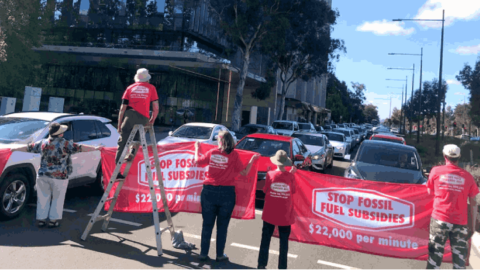
Stop Fossil Fuel Subsidies is a climate defence organisation that recently developed out of Fireproof Australia, which is the group Violet Coco was involved with when she was arrested on the Sydney Harbour Bridge and subsequently sentenced to 15 months prison time in relation to it.
Danny, how is this development being taken amongst your group and the broader grassroots climate activist community?
To be honest, this is what we expected. If you look at history, if you look at the suffragette movement or the civil rights movement, it always seems to go this way.
What did Gandhi say? First, they ignore you. Then they laugh at you. Then they fight you. And then you win.
That’s summing up this trajectory really well. We didn’t want it to happen like this. But I can’t lie and say it was unexpected.
Fireproof Australia and Blockade Australia were the two climate defence groups taking heightened climate action earlier this year in response to government inaction, which resulted in the rollout of the new laws.
How have these laws affected climate protest in NSW?
Certainly, before and at the time that these new laws were rammed through, there was some dissent within the movement. There were voices calling out for these kinds of actions to stop, because they were endangering the entire movement.
I can understand that, but at the same time, to stop doing what is effective through intimidation isn’t a successful long-term strategy.
This is such an important message that we need to do whatever we non-violently can do to get ourselves heard and start dialogue for the possibility of some positive change.
So, do you think the new regime has impacted protest?
That’s hard to tell because we’ve had COVID and all of the things that have come from that.
Plus, we’ve had those rightwing protest movements, which make it harder to ensure that our message isn’t mixed up with sovereign citizens, white supremacy and antivax.
But definitely, it hasn’t been a golden age for nonviolent civil disobedience, which is frightening because now is the time that the action is needed most. It’s getting too late, and the consequences are far too dire.
SFFS has recently been formed in the wake of the fallout from the new anti-protest regime. It’s shifted its new civil resistance campaign to Canberra.
Can you tell us about what that’s involved?
SFFS is a rebranding of Fireproof Australia. So, it’s a lot of the same core people, the same goals and planned outcomes.
It’s like when Insulate Britain rebranded themselves to Just Stop Oil. We are doing multiple things and trying to get multiple messages across, because there’s so much that needs to get heard.
It’s been a long road. But we’re satisfied about the way things eventuated down in Canberra.
The fact that the suffragette artworks are in Parliament House made the gluing on extremely effective and emotive.
It has shown how much we all have such respect for the suffragette movement and so much of what we do is based on what they did and their successes. So, that was just a perfect situation.
As for Andy Warhol, that whole group of artworks were about consumerism gone mad. And that’s pretty much what’s getting us into this hole at the moment. Again, that was a perfect message and it got heard.
With both those actions, we were extremely careful that none of the artworks were damaged in any way, because the damage is being caused by government inaction and the fossil fuel industry, not by us.
We are fighting to save things, not destroy them.
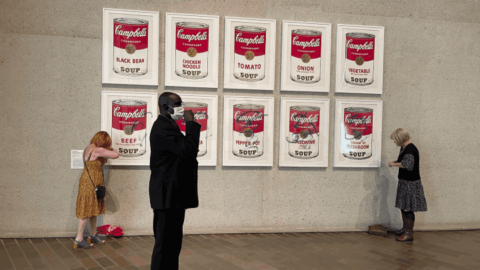
And what was the reaction of authorities like in the ACT? How would you compare it with NSW?
NSW has certainly become a lot more draconian in its policing. We saw that around Blockade Australia and Fireproof Australia.
There are a lot more arrests and tonnes more police. We saw Blockade having picnics in parks shut down and officers going onto private properties to arrest people.
Canberra, up until now, has been a much different environment. They’ve been less brutal in the way they’ve done things. But this time around it was a little different. We’ve certainly seen them upping the ante.
Many people were followed by police. They’d approach people in coffee shops to ask questions. It wasn’t the level of NSW, but it was not reminiscent of Canberra in the past.
So, they’ve been moving into that area of paying people special visits in Canberra?
Yes. They’ve picked people up from coffee shops. It’s pretty obvious the word has come down from on high that they need to pick up their game because the truth cannot get out.
But just before this there was a big fossil fuel conference in NSW and over 50 people, several of whom have never been arrested but have just signed Form 1s for peaceful protests, had police come to their houses and other places to ask them about things that hadn’t even happened yet.
One of our people had their car searched for over half an hour just driving to Canberra. It just shows the escalation. They’re trying to get us in trouble before any actual action has happened.
Over recent weeks, there has been a lot of talk about climate protests and punishment but not so much of a focus on the actual crisis.
What is the state of the climate emergency at present? And further, how would you sum up its impact on this continent over recent years?
It’s pretty clear that governments, the judicial system, law enforcement and the majority of mainstream media are all playing from the same handbook.
This is all a great smokescreen for what they don’t want to be heard, which is everyday ordinary people, along with scientists and others, calling out the true danger that we are in if we don’t change our trajectory.
It’s pretty obvious to anybody who doesn’t have their head in the sand that not only on our continent but globally there are increasing extreme weather events that are just getting worse and more frequent.
The 2019-20 Black Summer fires were the first major indication to Australians that the crisis is already here – that global climate change is already affecting us.
Then that was followed by unprecedented floods on one side of the country, and on the other side, we’ve had droughts and fires.
So, it’s not possible to pretend it’s not affecting us already and it’s going to get worse.
With this trajectory, they’ve already said that if we don’t make major changes, we will be past the one point five degrees mark by 2040 and a lot worse by the end of the century. And that is terrifying, because they’re tipping points, and they just get worse.
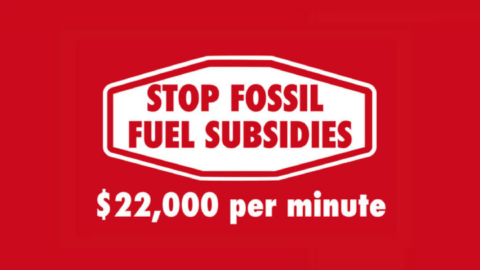
And lastly, Danny, SFFS supporters have been on the frontline while the anti-protest regime was being rolled out and the measures were first being enforced.
How is the group expecting this to play out from here? And if the laws do stand, what will that mean for those wanting to raise awareness to climate change?
If the laws stay, it’s going to put a lot more pressure on a small group of people to get more and more bold with nonviolent actions.
It may well open the floodgates to a bunch of other people standing up, speaking out and taking action against this attack on truth and our future.
But at the moment, it’s hard to tell. It’s exciting to see all of these different groups coming together and speaking out so loudly and boldly against the trends that are happening with the laws.
So, I’m hopeful. But it certainly isn’t making life any easier for us to be able to try and start a dialogue. And let’s be honest, at the end of the day, we’re trying to disrupt, but we’re not doing it for selfish reasons.
We are doing this to beg the government and the powers that be to start honest dialogue so that we can actually do the right things to help to prepare for what’s coming and to minimise future effects.
This is not rocket science. We’re saying, “Come talk to us.” We wouldn’t have to sit on a road or stick ourselves to a painting if we had honest dialogue and we were making full progressive change.


